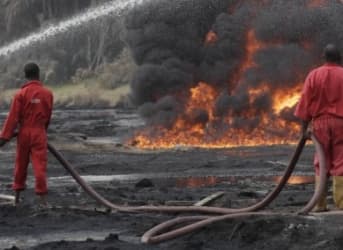Hidden among the ballyhoo about a collaborative freeze in production growth, a less visible but far more effective dynamic has affected, and likely will affect, oil supply and price: military intervention.
There have always been three routes out of the unsustainably low prices: natural decline/growth of supply/demand, collaboration constraints on supply, and military conflict. Since January, while the talk of a growth freeze had no effect whatsoever on actual supply, the natural decline/growth did reduce the overhang by a couple of hundred thousand barrels of oil per day. Meanwhile, two little-discussed and less-understood military interventions took a combined 900,000 bopd out of supply in a virtual instant.
In February, a “military type explosive charge” detonated on a subsea pipeline in Nigeria, taking out up to 300,000 bopd. The attack was characterized as “sophisticated” and “highly skilled,” not least because it was executed by divers under 20 feet of water. One source reported, “The people who did this knew what they were doing and they wanted maximum damage.” Related: Can Oil Continue To Rally Like This?
The history of attacks by rebels on oil infrastructure in the Niger Delta and the coincident prosecution of a former rebel superficially suggested that this attack was another in protest. On the other hand, responsibility for the attack was first claimed two months after the fact and by a group not previously known to exist, namely the Niger Delta Avengers. Moreover, the sophistication of the attack diverges from the historical airboat-and-AK style of rebels in the region.
A similarly mysterious outage affected 600,000 bopd out of northern Iraq. Located in a region of multi-lateral conflict and poor transparency, this interruption could be easily dismissed. Nevertheless, the fact remains that the exact cause of this major supply interruption was not publicly claimed or understood by any of the parties.
The collapse of oil price over the last 18 months has been catastrophic on the income of many nations, most of which have been helpless price-takers. While Saudi Arabia has pricing power, it has chosen and enforced lower prices. On the other side of the equation, two nations have the need, the national character and the capability to pursue military intervention in prices: Russia and Iran. Related: ExxonMobil Loses AAA Credit Rating For First Time Since 1930
Perhaps the attacks in Nigeria and Kurdistan were covert sabotage to increase oil price. Even if they were not, such attacks are likely to continue or even increase. Niger Delta Avengers has pledged more attacks, and the conflict around Kurdistan, Syria and Turkey is likely to continue. Nigeria provides about 1.8 million bopd to the world while Iraq supplies about 4.4 million bopd.
What is more, other oil-producing locations present similar conflicts and similar opportunities for covert, or even overt, military action which would affect supply. Libya, Algeria, northern Nigeria and the Sinai Peninsula all have concentrations of ISIS activity.
Libya currently supplies only about 0.4 million bopd to the world, but Algeria, with a lesser concentration of ISIS, provides 1.1 million bopd. Egypt does not export oil, but several million bopd of supply move through the Suez Canal in the region of active ISIS attacks. Any of these, or a few other locations, could host an attack on oil infrastructure, even one overtly conducted by Russia as part of its campaign against ISIS. Related: Chesapeake Has Bought Itself Time But Can It Survive?
Also looming, of course, is the remote but catastrophic possibility that Russia and/or Iran could take a fight directly to Saudi Arabia. Russia has formed an alliance with the axis of Shiite countries and against the Saudi-backed Sunni forces in Syria, and the animosity between Iran and Saudi has blistered in recent months.
Silently but effectively, military intervention has actually been the largest driver of oil supply and, perhaps, of oil price in the last few months. The failing of other means of price support and the repair of the Nigerian and Kurdish interruptions could keep prices from rising further in the short run. But then again, there is always the possibility that more military actions on oil supply occur in the near future.
By Dwayne Purvis for Oilprice.com
More Top Reads From Oilprice.com:
- Oil Up As Quarterly Earnings Season Kicks Off
- Saudi Arabia Releases Ambitious Plan To Diversify Economy
- China Stockpiling Oil At Highest Rate In Over A Decade

















